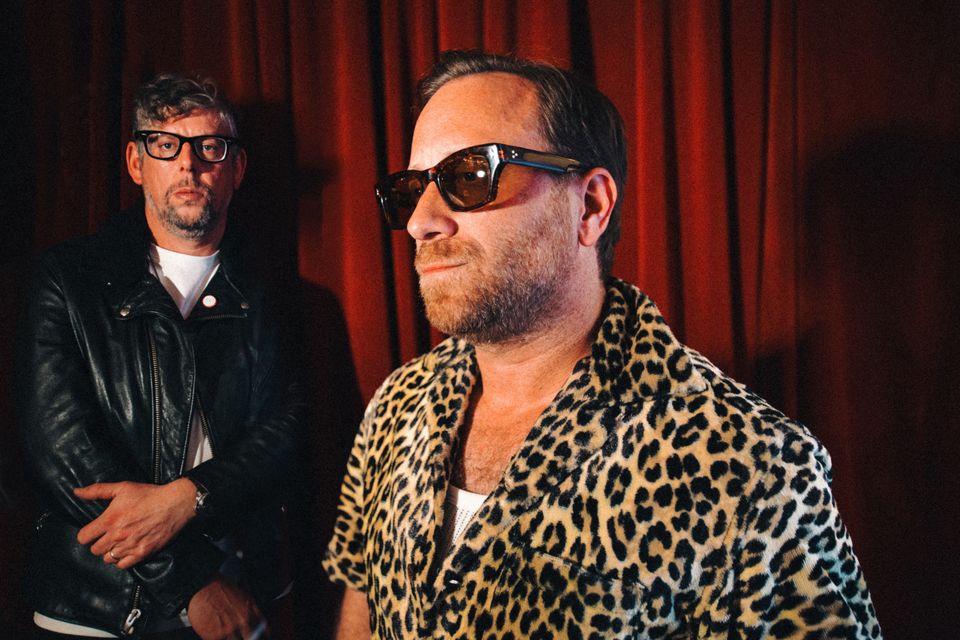The Black Keys on online hate: ‘Nasty comments are the ones we find funniest’
Ahead of the band’s appearance at the 3Arena in May, Dan Auerbach describes how the band welcomed Beck and Noel Gallagher as collaborators on new album Ohio Players
Patrick Carney and Dan Auerbach of the Black Keys. Photo: Larry Niehues
It may seem like an obvious observation, but playing in one of the most renowned rock duos of their generation is supposed to be, well, fun. After over 20 years together as The Black Keys, though, ‘fun’ is a concept that Dan Auerbach and Patrick Carney have only recently embraced in any meaningful way.
Now, with their 12th studio album about to be released, the band from Akron, Ohio, have hit a creative purple patch. Ohio Players, named after the 1970s funk band, continues where their previous album Dropout Boogie left off. It incorporates soul and hip-hop into their blues-rock sound, and there are collaborations with numerous musical friends and acquaintances — some of them less expected than others.
Frontman and guitarist Auerbach says they had a change in mindset following 2021 album Delta Kream, a collection of hill country blues covers, and their ‘Record Hangs’ — vinyl DJ dance parties held in venues around the world.
“We thought ‘Oh. We can just get together and have complete fun, and not have to worry about anything; just put out a record,” he says from his home in Nashville. “That was really refreshing to us; we didn’t even have to tour it [their facetious ‘World Tour’ that year consisted of just three intimate venues in the US].
“And then we started to enjoy it, and that made us want to work harder. We were having fun,” he shrugs, “and I don’t think we’ve ever worked more on a record than on this one.”
Auerbach has just returned from the SXSW festival in Texas where the Black Keys performed, promoted various artists signed to their Easy Eye Sound label and attended the world premiere of This is a Film About the Black Keys. The documentary film charts their history from college dropouts, to becoming one of the biggest rock bands of the 21st century.
Watching himself on screen, Auerbach agrees, was not enjoyable. “I would give my acting a very low Rotten Tomatoes score,” he laughs. “But it’s funny; I don’t think my perspective has changed much over the years. I’m still after the same things, really: just trying to make things I like. I mean, I’m glad I don’t have to make another documentary.”
He chuckles. “Looking back is not my favourite thing; I like to move forward. I like to wake up early in the morning and think about what I gotta do today. But it is nice that [our] story was able to be told.”
One thing that has changed is The Black Keys’ willingness to collaborate. Although they have dabbled in co-songwriting with the likes of producer Danger Mouse on 2014’s Turn Blue, with ZZ Top’s Billy Gibbons on Dropout Boogie and a multitude of rappers on 2009’s rap-rock crossover album Blakroc, the Black Keys’ songwriting room has largely been a closed shop until now.
Read more
“The first person we called was Beck,” says Auerbach of the fellow indie superstar who co-wrote several tracks on Ohio Players. “We’ve known him for years and years and we’ve talked about getting together, but we just never did. But the first day we got together, we wrote This is Nowhere — so we just hit the ground running. And I’m glad it took that long to get together, because we just weren’t ready. Even five years ago, we just weren’t ready. Now, we’re in a good place, and comfortable enough with ourselves to sit back and let someone else in.”
What’s different? Auerbach contemplates the question for a moment. “We were just so absolutely crippled by insecurity when we first started,” he admits. “We would just hole up in a basement or an abandoned tyre factory — just the two of us, for hours on end — trying to figure out how to make things work. But every time we open ourselves up to collaboration, it always pays off — and we only invite people into our world that we are genuinely interested in, or respect the work of.”
Another more unexpected name in the writing credits of Ohio Players was former Oasis guitarist Noel Gallagher, whom The Black Keys had previously only met in passing a couple of times.
“When we thought about people who were great songwriters, he was one of the first to come to mind,” he nods. “[He’s] just someone who is similar to Tom Petty; you don’t even have to own the records, you just magically know all the songs, somehow, because they’re just in the fabric of everyday life. Everyone told us, ‘He doesn’t co-write with anybody. He never does that’, but we reached out, and he said he’d be interested if we came to London. So we hopped on a plane and we took a chance.”
They met in “tiny” analogue recording studio Toe Rag in London, “and we hammered out three songs in three days. We had so much fun,” he recalls. “We were really kind of nervous when we started, but when we got that first song done, it took the pressure off and we really got to enjoy it. He’s funny as hell to be around, and it was incredible to watch him do his thing and work his magic.”
Ohio Players also returns to the pair’s love of hip-hop with Candy and Her Friends, which features 1990s Memphis rapper Lil Noid, and Paper Crowns, which features Beck and hip-hop star Juicy J. “We were just inspired by that music over the last two years of making Ohio Players,” says Auerbach. “It did remind me of the process of Blackroc a little bit — but this was its own thing.”
Given how versatile and celebratory this album is, it would be understandable if the Black Keys felt underestimated by some quarters over the course of their career, reduced to a simplistic ‘blues-rock duo’ headline. Auerbach chuckles.
“I think any band who has enough ‘hits’ just gets hate. With the hits comes the hate, and that’s just how it is. I think we’ve always just done what we do, and we’ve only really recently started to come out of our shells, to be honest.”
We did an almost inhumane amount of touring, and I think it really burned us out
He sighs softly. “I think we maybe used to think more about that kind of stuff. I know Pat did a lot, and it used to bug him a lot. But… I dunno. We’ve gotten to a place where we’re sort of comfortable with ourselves, and I think it’s the same reason we’re comfortable with collaborating now. We don’t worry about that shit any more. When we see a nasty comment, it’s usually the one that we think is the funniest,” he adds, laughing. “Sometimes I wish there were more, because they’re entertaining.”
There is no question that everything changed for the Black Keys with their 2010 album Brothers, which spawned massive singles Tighten Up and Howlin’ for You. It nudged the pair’s trajectory from ‘leftfield indie band with a cult following’ into mainstream territory, and the shows grew bigger and bigger. Suddenly, after years of playing theatres, they were filling arenas and headlining festivals.
“I think that what we could never get comfortable with was the amount of touring,” admits Auerbach of that transitional period. “We did an almost inhumane amount of touring, and I think it really burned us out. No one that we were paying to advise us ever suggested taking some time off — so we really had to figure that out for ourselves and yeah, it almost burned us out.
“It wasn’t because we didn’t love making music together; it was because we didn’t get to make enough music together. That was the problem. Going on stage and playing the same stuff every night is fun to a point, but you can’t overdo it and you’ve gotta be able to create new stuff. You have to have time to be creative, or else the shows suffer and everything else suffers. So we just pay closer attention to that, now.”
Their coping strategies for long tours now are simple. “We spend a lot of money on a nice hotel,” he laughs. “Eat a nice steak? I dunno. Stuff like that; stuff that we never used to do.”
Although Auerbach’s other band, The Arcs, released their second album last year, it’s also been seven years now since his last solo album, the excellent Waiting on a Song. There will be another at some stage, he promises, when he figures out some way of mapping out the hundreds of tracks currently sitting on hard drives.
For now, there is plenty else to be getting on with. He returns again to that notion of looking forward, not back; a particularly apt philosophy during what feels like a new dawn for The Black Keys. If nothing else, Ohio Players has proven their enduring ambition and bountiful ideas. The possibilities, Auerbach agrees, are endless.
“I feel like we make music that you can kind of grow old with, maybe,” he muses. “We don’t really get too dressed up, and it’s never been about image with us; it’s always been a little bit raw. I think music like that ages a little more gracefully.
“But y’know… most of my heroes when I was young were in their 60s and 70s: RL Burnside, T-Model Ford, Junior Kimbrough. These are guys who were alive playing shows, and they were old as hell when I was going to see them, but they were my favourites.” He stops, laughing loudly at the notion of he and Patrick following the same path as those grizzled bluesmen, another 30 years down the line. “I dunno,” he says with another soft chuckle. “I think we still got a ways to go.”
‘Ohio Players’ is released on April 5. The Black Keys play Dublin’s 3Arena on May 3
Join the Irish Independent WhatsApp channel
Stay up to date with all the latest news











